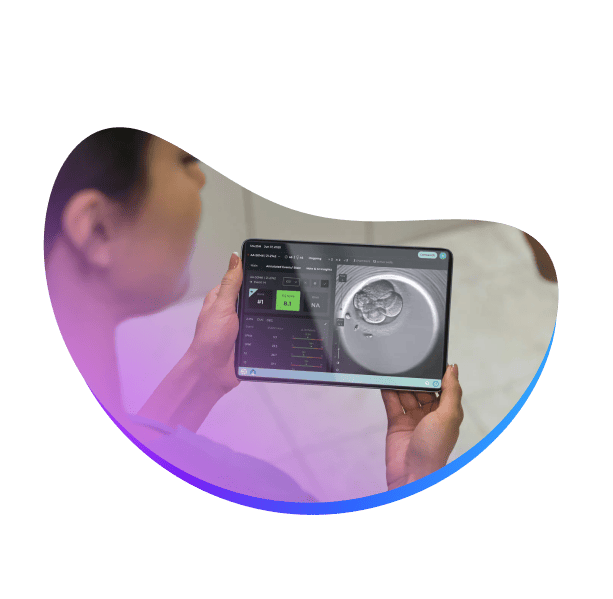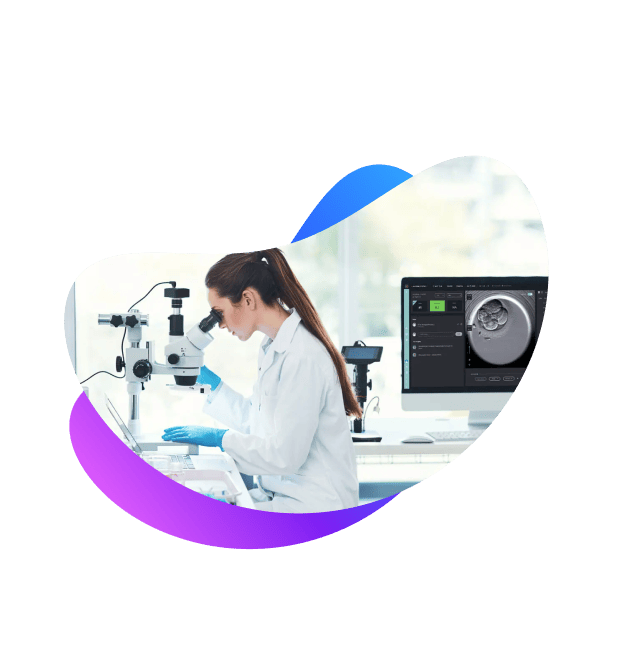With the aim of achieving pregnancy in our patients in the shortest possible time, we incorporate artificial intelligence in our IVF laboratory.
CHLOE™ and WeFIV, together to help you fulfill your dream of building a family.
CHLOE™ is a revolutionary artificial intelligence (AI) based technology developed by Fairtility™, designed to transform reproductive care through transparency and precision.
This tool analyzes embryo development with the goal of setting a new standard in In Vitro Fertilization (IVF) treatments.



CHLOE™ is a revolutionary artificial intelligence (AI) based technology developed by Fairtility™, designed to transform reproductive care through transparency and precision.
This tool analyzes embryo development with the goal of setting a new standard in In Vitro Fertilization (IVF) treatments.




CHLOE™ does not replace medical professionals; instead, it acts as a complement that enhances the quality of care and reinforces the commitment to successful fertility treatments.
VIOLET™ is a report generated through the use of an artificial intelligence tool provided by the company Future Fertility.
This report provides an assessment of the patient’s egg quality as well as personalized predictions of the likelihood of each egg developing into a blastocyst, an embryo on the fifth day of development.
In addition to assessing egg quality, the VIOLET™ report is also able to provide a personalized prediction of the likelihood of achieving a successful pregnancy based on the number of oocytes obtained during ovarian puncture.
Unlike other approaches that rely solely on the number of mature oocytes and the patient’s age, VIOLET™ recognizes that each person is unique in terms of health and fertility.
VIOLET™ has been designed to make it easier for patients to read and interpret the report, allowing them to actively participate in more informed decision making. The content of the report provides clear and personalized knowledge about the fertility treatment, helping to improve decision making by both physicians and patients. As always, we recommend that the results be evaluated together with the specialist in the consultation to ensure the proper interpretation of the information.
MAGENTA™ provides us with personalized scores of egg quality based on images of patients’ eggs (oocytes), comparing them with over 70,000 images of other eggs and their outcomes.
A higher score in MAGENTA™ correlates with a higher probability of eggs developing into a blastocyst on the fifth or sixth day.
The obtained report is easy to understand, allowing patients to approach their treatment from a more informed standpoint. The information is presented in a clear and personalized manner, improving future planning in consultation with the specialist.
The Embryoscope is an incubator with artificial intelligence used for embryo selection, showing excellent success rates in assisted reproduction treatments.
With a built-in camera, it takes photos every 10 minutes from different angles, generating a video. These videos are uploaded to the cloud to be analyzed by the IDAScore software, completely automatically, eliminating any subjectivity from the operator.
The Embryoscope is the most suitable tool for embryo development and selection. Along with the advantage of greater temperature and gas stability, this type of incubator allows minute-by-minute monitoring of development.
Furthermore, through Artificial Intelligence, embryos are evaluated based on several variables beyond the morphological assessment made by the human eye, optimizing the embryo score for transfer. All of this improves pregnancy rates and shortens the time to pregnancy.

CHLOE™ gives you the opportunity to closely monitor the development of your embryos, which can help you feel more connected to the process and reduce anxiety during your assisted reproduction treatment. Additionally, having more information will empower you to make informed decisions together with your doctor.
Yes, CHLOE™ has proven to be a safe and effective tool. It has been peer-validated to enhance accuracy in embryo selection, thereby increasing the chances of success in fertility treatments. It has a 96% accuracy rate in predicting blastocyst development and a 73% accuracy rate in predicting implantation.
Artificial Intelligence is a technology that follows certain steps or patterns to reach a conclusion. Its great advantage is that it can analyze data and provide highly accurate solutions, even better than humans.
However, sometimes these “steps” can be difficult to understand. Transparent AI allows us to see how conclusions are reached, showing the “why” behind each response. This is important because it helps prevent errors or decisions based on incorrect assumptions due to potential biases.
In summary, Transparent AI ensures that processes are clear and reliable, which is essential for delivering fair and precise results.
CHLOE™ cannot be used in treatments such as Intrauterine insemination. This procedure is a low complexity treatment aimed at increasing the chances of pregnancy by introducing previously selected sperm into the uterine cavity of the woman. CHLOE™ technology is specifically designed to analyze in vitro embryos and can only be applied to high-complexity fertility treatments such as In Vitro Fertilization (IVF). Its main function is to assess embryo quality and potential to maximize the chances of implantation in advanced treatments.
CHLOE™ involves an additional cost in IVF treatments because it provides advanced embryo analysis using specialized equipment and a detailed evaluation process. Its main value lies in its ability to improve embryo selection, significantly increasing the chances of implantation in assisted reproduction treatments, optimizing the process, and offering a more precise and effective solution.
By increasing the probability of implantation on the first attempt, CHLOE™ helps reduce the need to repeat the treatment, which can be emotionally demanding for couples seeking to fulfill their dream of becoming parents. This level of precision allows them to approach the treatment with greater confidence and peace of mind, knowing that their chances are being maximized from the start.
Artificial intelligence is currently used through various tools in the laboratory. These tools help to remove subjectivity when evaluating gametes and embryos, and thus improve the chances of pregnancy.
No. Artificial intelligence is utilized through software and does not impact embryos.
The use of artificial intelligence in assisted reproductive treatments helps shorten the “time to pregnancy.” In other words, it reduces the time it takes to achieve pregnancy by assisting in identifying the embryo with the best chances of implantation.
No. The use of artificial intelligence tools does not remove the need to perform a genetic study of the embryos when indicated by the specialist.
Where is WeFIV
Soler 5552
Buenos Aires City, Buenos Aires
